In Japanese, yokumo よくも means "HOW DARE YOU?!?!?!?!?!" most of the time. Technically, it's just the adverb yoku よく intensified by mo も, and as such it can be used when good things happen, too, but it's mostly used when bad things happens, specially in anime.
The word can also be spelled yokumo 善くも, although that's unusual.
Explanation
Basically, the adverb yoku よく can sometimes be used to compliment someone for doing something. To show approval for their acts. To say it's "impressive" for someone to do something. And so on. For example:
- Context: characters arrive somewhere.
- umu
うむ
Hmm. - yoku kita
よく来た
[You] came well.- You've done well by coming.
- Thank you for coming.
- Coming here was a good idea. (if you didn't come that would've been bad.)
- kita
来た
Past form of the irregular verb: - kuru
来る
To come.
The word yoku mo よくも is just an intensified version of it. It would be just the difference between "impressive" and "very impressive."
- yoku mo konna ni tabeta na
よくもこんなに食べたな
It's very impressive [that you] ate this much.- I'm very impressed by how much you ate.
However, yoku isn't only used to say you're "impressed" in the sense of "amazed" by something good. The word yoku can also be used when you're "impressed" by how bad something is.
When yoku mo is used, it's often in the sense of being "very impressed " by how bad something is. For example:
- yoku mo nagutta na
よくも殴ったな
It's very impressive [that you] hit [me].- Because that's nuts.
- How dare you?!
- HOW DARE YOU HIT ME?!?!?!?!?
So that's how it works: yoku mo doesn't literally mean "how dare you," it means you're dumbfounded that someone dared do something. And it's usually used by enraged characters to mean they're really not happy at all about it.
- damashita.........
- boku wo.........
- yoku......mo
- yoku mo boku wo.........
- (patience. He's taken by fury now. He'll yell a complete sentence in a moment.)
- YOKU MO BOKU WOO!!
DAMASHITA NAA!!
よくもぼくをォ!!
だましたなァ!!
IT IS VERY IMPRESSIVE [THAT YOU] DECEIVED ME, [HUH?]!!!!- HOW COULD YOU DARE DECEIVE ME?!?!?!?!?!
- I CAN'T BELIEVE YOU LIED TO ME!!!!!!111234
- ォァ
These small kana were written to mean his screams are so strong the pronunciation of the vowels take longer than one mora.
Of course, yokumo is not always used by enraged characters. Sometimes it's used because someone must have had some nerve to dare do something.
- Context: the student council president Amakusa Shino 天草シノ, who has a complex about her breast size, sees Hagimura Suzu 萩村スズ, who has a complex about her stature, drinking milk.
- Hagimura wa gyuunyuu ga
suki nanda na
萩村は牛乳が好きなんだな
Hagimura, [you] like milk, don't you? - gyuunyuu wa seichou wo
unagasu
mono dakara
ii koto da
牛乳は成長を促すものだから良いことだ
Milk is a thing that stimulates growth, so it's a good thing.- A jab at the fact Hagimura is a shorty.
- *Hagimura stares at the student council president's flat chest.*
- kaichou wa gyuunyuu kirai desu ka
会長は牛乳嫌いですか
Do [you] hate milk, president?- kaichou
会長
[Student] council president. (used as a title. Translated as "you" here.)
- kaichou
- yokumo mesen shita ni
mukete kureta na
よくも目線下に向けてくれたな
You must have some nerve to look downwards [and say that].- mesen
目線
Line of sight. - shita ni mukeru
下に向ける
To point below. To point down. (her line of sight. i.e. to look downwards.) - kureta
くれた
To be given or done something by someone. (in this case, it refers to the act of Hagimura of looking downwards. How dare you "give" this to me? How dare you "do" this to me?)
- mesen
よくまあ
The phrase yoku maa よくまあ is another variant of yoku. It's not used used in an angry sense of "HOW DARE YOU!?!?!?!?!" like yoku mo is. Instead, yoku maa inserts a breather like "well," maa まぁ, between yoku and the rest of the phrase.
- yoku maa,
mai nichi mai nichi,
on'naji koto wo......
よくまあ、毎日毎日、おんなじことを・・・・・・
It's impressive, well, [that you keep doing] the same thing every day, every day......- This phrase ends with the object marking particle wo を, but doesn't have a verb. We can safely assume the verb Doraemon is going to say is "do."
- (although, to be honest, the word he actually used in the next panel was kurikaeshiteru くりかえしてる, "to be repeating [the same thing every day]," Basically the same thing, though.)
Besides yoku maa, the variants yoku zo よくぞ, yoku mo maa よくもまあ, etc. also exist.
Further Reading
References
- 善くも(よくも)の意味 -デジタル大辞泉 via dictionary.goo.ne.jp, accessed 2019-02-11.
- 「よくぞまあ」「よくもまあ」などの表現について! - okwave.jp, accessed 2019-02-11.
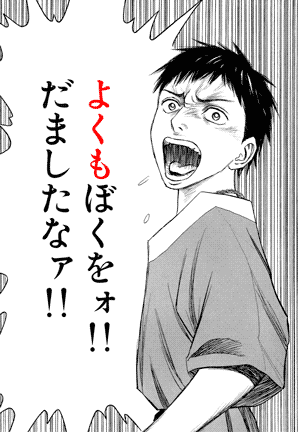
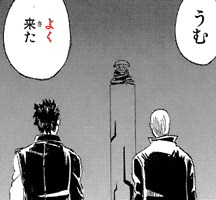
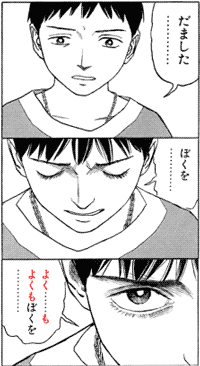
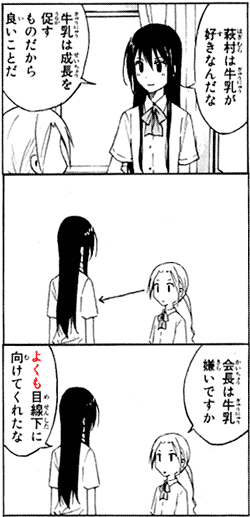
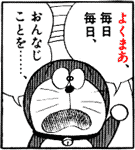
No comments: